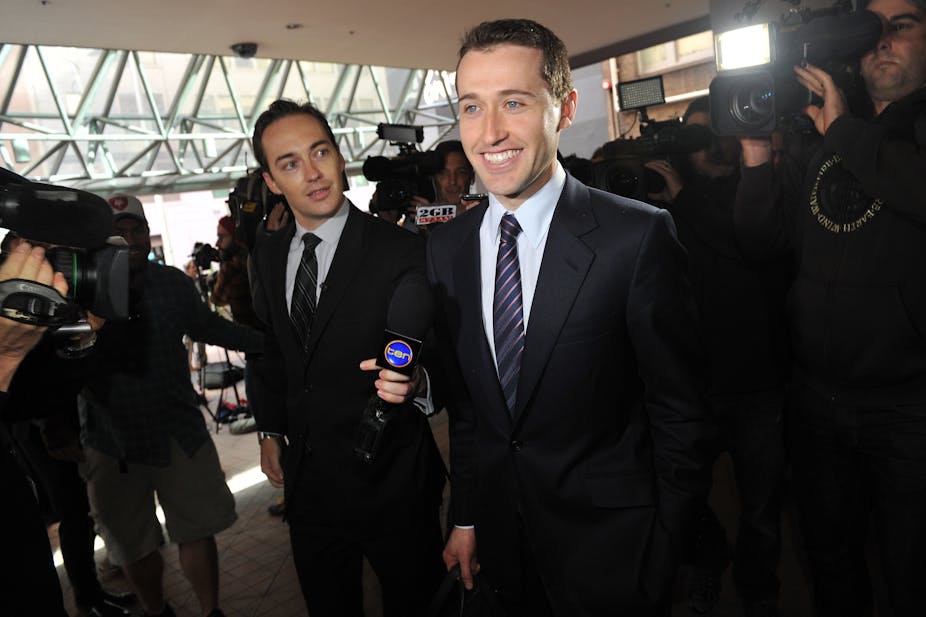What are the odds? In the face of public pressure, prime minister Julia Gillard has given bookmakers an ultimatum regarding sporting events.
If the bookies do not agree to a ban on gambling promotion during events, legislation will be introduced to this effect. The ban will not extend to advertising before or after the game, or during breaks in play.
Following the PM’s comments, free-to-air television’s umbrella body Free TV Australia reluctantly conceded: “these are unprecedented restrictions for broadcasters”; that “the government has acted in response to community concern”; and said they “will submit a revised code within the next two weeks”.
The “unprecedented restrictions” line poses the question: has Free TV Australia forgotten about restrictions on the advertising of alcohol and tobacco?
The Australian Wagering Council (AWC), which represents all the major betting companies involved, “welcome” the moves to curb live odds promotion, and say that they will end the practice. Their statement also includes wonderfully pious claptrap to the effect that:
….the AWC is committed to ensuring advertising by its members is undertaken in a socially responsible manner and is delivered in accordance with the promotion of responsible gambling and the need to protect the integrity of sport.
Of course, they add: “…we do not want children talking about gambling odds”.
The betting companies also find ingenious arguments to defend their promotion, claiming for example that curbs on Australian betting companies will increase trade in offshore companies, conveniently forgetting that much of the “Australian” betting industry is owned or registered overseas.
Bookmaker Tom Waterhouse may have done us all a favour. His company’s apparent omnipresence in televised sport, even as part of the broadcasting team, ignited a storm of real anger. Politicians, like so many of us, enjoy watching sport and have become offended at the way online betting has taken over our major televised sporting channels and events.
Until a few years ago, policy concerns about gambling focused primarily on pokies. But almost overnight, betting has never been easier, or more heavily promoted. We can bet anywhere, anytime, throwing money at the big online betting companies from wherever we happen to be.
They are unavoidable for anybody who watches sport – up to six channels at a time. The betting companies provide news and updates through direct advertising, along with myriad other promotions, from advertising in pre- and post-game commentary to on-screen crawls to venue advertising. Television and radio commentaries are riddled with betting references.
As Samantha Thomas and colleagues note in the Australian and New Zealand Journal of Public Health:
…the rapid diversification of wagering products through mobile and internet technologies have opened up a Pandora’s Box of gambling possibilities.
They also discuss how the ominpresence of advertising is leading to “the "gamblification” of sport:
Marketing strategies during sporting events are formed through a range of commercial agreements between the wagering industry and sporting codes, stadiums, scoreboard operators, broadcasters and individual clubs.
The major online betting sites are “official partners”, “approved betting partners”, “approved betting providers”, “approved sports betting providers” and “proud sponsors” of major sports such as AFL, NRL, cricket, tennis, rugby and so on (and of course of horse racing) as well as teams from Collingwood in the AFL to the NRL’s Sydney Roosters, both of whom are sponsored by Sportsbet.
Ironically, this upsurge in sports-approved gambling promotion comes when there is increasing speculation about the corrupting influence of gambling on sports, with leading players and even umpires under investigation. The Tom Waterhouse deal to become the NRL’s official gaming partner fell through, but was widely reported as being worth A$50 million – pointing to the magnitude of the sums involved.
Betting companies invest millions on promotion because they know it works. It promotes short-term gambling and a culture in which gambling is seen as a norm. While children may not bet directly, they are exposed to incessant promotion of gambling, growing up to associate gambling with sporting success, effectively being groomed to become the next generation of online gamblers.

So what is the state of play now following Gillard’s announcement?
TV promotion of live odds betting will end. This is supported by all sides of politics and most media, and is undoubtedly a step in the right direction. We should give credit where it is due: to those who pressed for action, and the betting companies who gave the campaigners all the ammunition they needed.
But it would be unwise to see this as anything more than a first step. We have learned from decades of efforts to protect children from advertising for tobacco and alcohol that cynical companies can be amazingly creative in finding ways around any restrictions. That is, after all, the way big-time commercial sports sponsorship got its initial massive boosts, as tobacco companies looked for ways around TV ad bans.
Government should only accept voluntary, self-regulatory codes as an alternative to legislation if the processes take wording, oversight and administration completely out of the hands of the gambling and advertising industries and are accompanied by significant penalties for breaches. Otherwise, long experience of such codes shows that they will be weak, carefully worded to ensure that they catch as little as possible, and feebly administered.
Governments seriously concerned to reduce children’s exposure to gambling promotion should ensure that there are legislated limits on advertising spending, and on the times when these ads appear.
The online betting companies are evidently flush with cash. They may take a hit to some forms of advertising, but it will not be long before they find other creative ways to spend their promotional dollars.
The only way to ensure that they are kept under control will be through legislation or establishment of a completely independent oversight body. Tom Waterhouse and other gambling companies will even now be turning their minds to ways of getting around the new codes.
That’s a sure bet.

